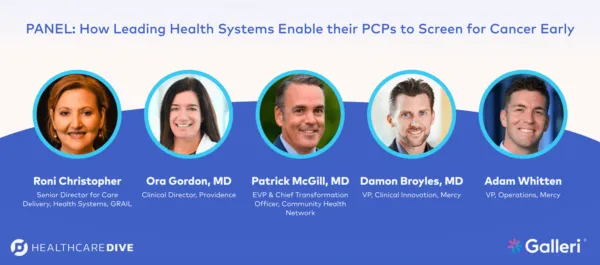Fill out the following form to watch the webinar
Additional details about the webinar can be found beneath the form.
Watch the webinar
By submitting this form, you agree to GRAIL’s use of this information to contact you, including for marketing purposes. Please do not include any sensitive or confidential information, including health information. For more information, please refer to our privacy notice.
How Leading Health Systems Enable their PCPs to Screen for Cancer Early
Today, most cancers are found late. After metastasis, patients only have a 1 in 5 chance of survival.1
When diagnosed early, the 5-year cancer survival rate is 4x higher than when diagnosed in later stages.1 Screening for cancers early and accurately can increase patients’ chances for successful cancer treatment.
Primary care providers (PCPs) in health systems can be challenged to implement novel technologies that unlock screening options for patients. Many health systems have already developed effective strategies to guide and support PCPs in incorporating multi-cancer early detection (MCED) into their practice.
During this webinar, hear from health system experts sharing their experiences in the implementation of MCED and how this innovative technology may increase the chance for successful cancer treatment.
Learn how:
Incorporating MCED into primary care can transform cancer screening
Health systems can educate PCPs and implement effective processes to support them and their patients
Health systems can position themselves as state-of-the-art providers by delivering MCED screenings

The Galleri test is recommended for use in adults with an elevated risk for cancer, such as those age 50 or older. The test does not detect all cancers and should be used in addition to routine cancer screening tests recommended by a healthcare provider. The Galleri test is intended to detect cancer signals and predict where in the body the cancer signal is located. Use of the test is not recommended in individuals who are pregnant, 21 years old or younger, or undergoing active cancer treatment.
Results should be interpreted by a healthcare provider in the context of medical history, clinical signs, and symptoms. A test result of No Cancer Signal Detected does not rule out cancer. A test result of Cancer Signal Detected requires confirmatory diagnostic evaluation by medically established procedures (e.g., imaging) to confirm cancer.
If cancer is not confirmed with further testing, it could mean that cancer is not present or testing was insufficient to detect cancer, including due to the cancer being located in a different part of the body. False positive (a cancer signal detected when cancer is not present) and false negative (a cancer signal not detected when cancer is present) test results do occur. Rx only.
The GRAIL clinical laboratory is certified under the Clinical Laboratory Improvement Amendments of 1988 (CLIA) and accredited by the College of American Pathologists. The Galleri test was developed — and its performance characteristics were determined — by GRAIL. The Galleri test has not been cleared or approved by the Food and Drug Administration. The GRAIL clinical laboratory is regulated under CLIA to perform high-complexity testing. The Galleri test is intended for clinical purposes.
Surveillance, Epidemiology, and End Results (SEER) Program (seer.cancer.gov) SEER*Stat Database: Incidence - SEER 18 Regs Research Data, Nov 2018 Sub. Includes persons aged 50-79 diagnosed 2006-2015 “Early/Localized” includes invasive localized tumors that have not spread beyond organ of origin, “Late/Metastasized” includes invasive cancers that have metastasized beyond the organ of origin to other parts of the body. Noone AM, Howlader N, Krapcho M, et al. (eds). SEER Cancer Statistics Review, 1975-2015, National Cancer Institute, Bethesda, MD, http://seer.cancer.gov/csr/197..., based on November 2017 SEER data submission, posted to the SEER website April 2018. Data on file GA_2021_004.